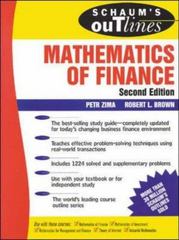
The following information relates to Questions 5-8. Briefly explain your answer to each question. Hannah Mishkin is a junior equity derivatives sales-trader at Smith Securities, LLP. Miskin has noticed a recent surge of option trading activity on the shares of Tesla. She decides to investigate pricing of Tesla put and call options. As part of her research, Miskin plots Tesla's implied 30-day volatility (IV 30) against various put deltas. The put delta represents the moneyness of available options. For example, a put with a delta of 20 is deeply out of the money. Miskin is trying to understand why the IV30 is not the same value for all put deltas. Tesla's 30-day implied volatility by put delta for the current date, and a 52-week average is shown below. TSLA IV 30 150.00 100.00 50.00 Implied Volatility,% 0.00 0.00 0.20 0.80 1.00 0.40 0.60 Put Delta IV 30 -52w Avg 5. A possible explanation of why Implied volatility on Tesla's out-of-the money (OTM) puts is greater than its at- the-money puts (ATM) is A. There is greater demand for ATM puts on Tesla than on OTM puts B. There is an increasing bullish sentiment on Tesla's share price C. There is an increasing bearish sentiment on Tesla's share price 6. Based on the chart above, Mishkin is likely to estimate Tesla's current at the money (ATM) volatility as closest to A. 89% B. 50% C. 110% 7. A common trading strategy employed to take advantage of an option's implied option skew is to buy or sell a so- called risk reversal. If Mishkin believes that Tesla's put volatility is too high relative to Tesla's call volatility, then she is most likely to A. Sell a risk reversal by buying the OTM put and selling the same expiration OTM call B. Buy a risk reversal by selling the OTM put and buying the same expiration OTM call C. Buy a risk reversal by buying the OTM put and buying the same expiration OTM call 8. The most common shape of a volatility curve of options on listed equities is A. Flat B. Skew C. Smile The following information relates to Questions 5-8. Briefly explain your answer to each question. Hannah Mishkin is a junior equity derivatives sales-trader at Smith Securities, LLP. Miskin has noticed a recent surge of option trading activity on the shares of Tesla. She decides to investigate pricing of Tesla put and call options. As part of her research, Miskin plots Tesla's implied 30-day volatility (IV 30) against various put deltas. The put delta represents the moneyness of available options. For example, a put with a delta of 20 is deeply out of the money. Miskin is trying to understand why the IV30 is not the same value for all put deltas. Tesla's 30-day implied volatility by put delta for the current date, and a 52-week average is shown below. TSLA IV 30 150.00 100.00 50.00 Implied Volatility,% 0.00 0.00 0.20 0.80 1.00 0.40 0.60 Put Delta IV 30 -52w Avg 5. A possible explanation of why Implied volatility on Tesla's out-of-the money (OTM) puts is greater than its at- the-money puts (ATM) is A. There is greater demand for ATM puts on Tesla than on OTM puts B. There is an increasing bullish sentiment on Tesla's share price C. There is an increasing bearish sentiment on Tesla's share price 6. Based on the chart above, Mishkin is likely to estimate Tesla's current at the money (ATM) volatility as closest to A. 89% B. 50% C. 110% 7. A common trading strategy employed to take advantage of an option's implied option skew is to buy or sell a so- called risk reversal. If Mishkin believes that Tesla's put volatility is too high relative to Tesla's call volatility, then she is most likely to A. Sell a risk reversal by buying the OTM put and selling the same expiration OTM call B. Buy a risk reversal by selling the OTM put and buying the same expiration OTM call C. Buy a risk reversal by buying the OTM put and buying the same expiration OTM call 8. The most common shape of a volatility curve of options on listed equities is A. Flat B. Skew C. Smile







